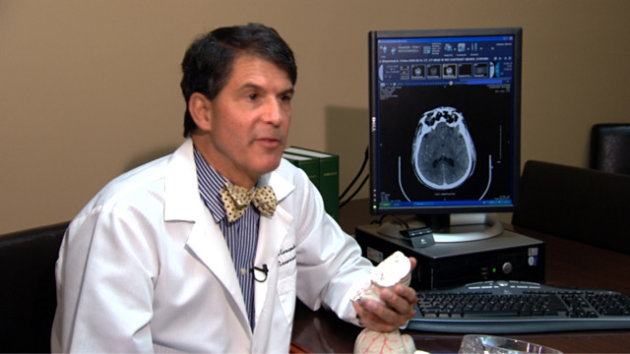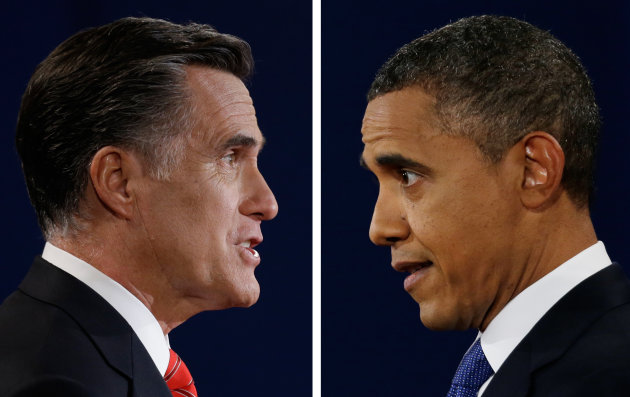Why don't these voters decide? Some like to mull
By | Associated Press – 4 hrs ago
WASHINGTON (AP) — Who are these people who still can't make up their minds? They're undecided voters like Kelly Cox, who spends his days repairing the big rigs that haul central California's walnuts, grapes, milk and more across America.
He doesn't put much faith in either Barack Obama or Mitt Romney.
But he figures he's got plenty of time — a little more than a week — to
settle on one of them before Nov. 6. And he definitely does plan to
vote.
"I'll do some online research," said Cox, co-owner of a
Delhi, Calif., truck repair shop. "I don't have time to watch
presidential debates because it's a lot of garbage anyway. They're not
asking the questions that the people want to hear."
About 5 percent of Americans with solid plans to vote have yet to pick their presidential candidate,
according to a new AP-GfK poll. When you add in those who lean only
tentatively toward their choice or won't declare a favorite, about 16
percent of likely voters look ripe for persuasion. That's about the same
as a month ago.
In a super-tight race, undecided voters have
taken on almost mythic stature. Their questions at the town hall-style
debate are parsed. Campaign techies wade through data to find them. The
president dialed up 9,000 of them for an Air Force One conference call
as he flew to Los Angeles this week.But the undecided also endure Twitter sniping and late-night TV ribbing. They're derided as uninformed nincompoops who don't merit the power they wield. As David Letterman put it: "You're idiots! Make up your mind!"
Do these wafflers, ruminators and procrastinators deserve coddling — or scorn? Are they just misunderstood?
A look at who they are and what they're waiting for:
___
THEY'RE NOT BLANK SLATES
Two-thirds of persuadable voters have an established party preference, the AP-GfK poll shows. They're roughly divided between those who call themselves Democrats or lean that way and those who are Republicans or lean to that side.
So why not just plan to vote with their party?
"They are really a little bit torn," said Lynn Vavreck,
an associate professor of political science at the University of
California, Los Angeles. "They may have some issue positions that are
counter to their party, or they're not sure how they stand on some
things."
Nancy Hoang, a University of Minnesota freshman studying
mathematics, considers herself a fiscal conservative and leans
Republican. Yet she vacillated because she agrees with the Democrats'
support for gay marriage and opposition to voter ID laws.
"I could have gone either way," said Hoang, 18. Not until after the final debate Monday did she decide: Her first-ever presidential vote will go to Romney.
Most
of these undecided voters will come home to their favored party by
Election Day, predicts Vavreck, who studies an ongoing survey of
registered voters as well as trends from past elections.___
STILL, A GOOD CHUNK ARE INDEPENDENTS
About 30 percent of persuadable voters say they're political independents. That's three times the presence of independents — just 8 percent — among likely voters who have decided who they'll vote for, according to the AP-GfK poll.
In an increasingly polarized America, they stand out. Robert Dohrenburg, a small business owner in McAllen, Texas, voted for Republicans Ronald Reagan and George H.W. Bush, but not for Bush's son, George W. He backed Obama in 2008, then had second thoughts this year.
Dohrenburg, 56, watched all three presidential debates before making up his mind to stick with Obama, in part because Romney "says one thing today and another thing tomorrow."
He wishes Ron Paul had won the Republican nomination.
"I'm a very strong independent," he said. "I choose the best candidate."
___
ARE THEY EVEN PAYING ATTENTION?
Professors have a euphemism: low-information voters. The bulk of registered voters who are still undecided fall into that group, researchers say.
"They're basically not that interested in politics," Vavreck said. "They pay less attention to news in general."
Her image of the typical undecided American, based on her research: "the single mom with a couple of kids who just doesn't have time to be attuned to politics but feels like it's her civic duty to vote, and may or may not show up at the polls."
Yet the still-deciding who are committed to voting don't see themselves as out of touch.
In the AP-GfK poll, 85 percent of the persuadables said they have a "great deal" or "quite a bit" of interest in following the campaign, almost as high as among other likely voters.
Rita Kirk, a communications professor at Southern Methodist University, seeks out these involved-but-undecided voters in swing counties of states with close presidential contests. She gathered the groups that recorded their live reactions on CNN during the debates. They are following the race, she insists.
"They know that they're in a county that's going to make a difference," Kirk said. "They're wanting to make a good choice, and they kind of feel the weight and gravitas of that."
___
SO WHAT DO THEY THINK?
They're of two minds.
Persuadable voters are more likely to trust Romney to do a better job handling the economy and the federal budget deficit, the AP-GfK poll shows. And they're about as comfortable with Romney as they are with Obama on foreign policy.
They are more likely to say Obama has a clear vision for the future, however. They tend to say he understands the problems of people like them better than Romney does. They also give Obama a broad advantage on making the right decision on women's issues.
They're worried about the future.
Only 3 in 10 persuadable voters think the economy will improve in the coming year, compared with 6 in 10 decided voters.
"I'm not sure that either candidate is going to be able to correct the issues," said Cox, 43, who watched California's Central Valley suffer through recession and drought. "I'd like to get the jobs back in the United States. I'd like to quit owing China everything. Put the farmers back to work."
___
WHAT'S TAKING THEM SO LONG?
Some see virtue in refusing to rush.
Victoria Cook, a 27-year-old psychology student at Arapahoe Community College near Denver, leans toward Obama. But she stood in line to see Romney and Ryan at a rally with rocker Kid Rock this week.
"I don't want it to get to the point where you just write off the other guys right away," Cook said as she waited. "So I'll listen to what they have to say."
Professor Kirk
said many undecided voters are so annoyed by months of TV commercials
and punditry and news coverage that they just tune it all out until
Election Day nears.
"They want to pay attention at the time
they're ready to make a choice," she said. "It's like someone buying a
car. That's when they start looking at the consumer magazines and all
the attributes and how many airbags do the different models have. Not
months in advance."___
WILL THEY DECIDE THIS ELECTION?
It's possible.
"That
small group of people can make a difference if the vast majority of
them swing in one direction," said Rutgers University political science
Professor Richard Lau, who studies how voters decide.
But that
would be unusual. Late deciders tend to be divided, not vote as a block —
unless they are swept up in a bigger wave, Lau said. In 1980, for
example, October polls showed President Jimmy Carter in a tight race
with Ronald Reagan."It was very close up until the last few days and somehow everybody just decided, 'Enough. We're going to change courses here,'" Lau said. "Usually what happens is that the independent voters change in the direction that somehow the nature of the times is already going."
Still, an advantage among procrastinators could swing the race in a hotly contested state.
In the last two presidential elections, about 1 in 10 voters surveyed as they left polling places said they'd settled on their candidate within the previous week. About 5 percent decided on Election Day.
No word on how many made up their minds while standing in the voting booth.
___
Associated Press News Survey Specialist Dennis Junius in Washington and Associated Press writer Philip Elliott in Denver contributed to this report.
___
Follow Connie Cass on Twitter: http://www.Twitter.com/ConnieCass
Follow Jennifer Agiesta on Twitter: http://www.Twitter.com/JennAgiesta
Explore Related Content
1 - 4 of 20







































2 comments